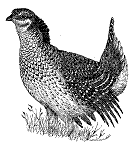Papers in the Biological Sciences

Papers in Ornithology
Document Type
Article
Date of this Version
2008
Citation
Molecular Ecology Resources 8 (2008), pp. 1249–1253; doi: 10.1111/j.1755-0998.2008.02342.x
Abstract
Molecular techniques for identifying sex of birds utilize length differences between CHD-Z and CHD-W introns, but in some cases these methods can lead to sexing errors. Here we show that an additional W-specific primer can be used in conjunction with a pre-existing sexing primer pair to dramatically improve the reliability of molecular sexing methods. We illustrate the approach with American coots (Fulica americana), a species with CHD-Z polymorphism that could not be accurately sexed using traditional methods. We developed a reverse primer GWR2 designed to sit within the intron of the W chromosome and amplify a distinctively small DNA fragment that serves as a W-specific marker. Analysis of known-sex individuals indicates that this W-specific primer provides an efficient and reliable protocol to identify the sex of F. americana. The development of such sex-specific primers will likely increase the reliability of molecular sexing methods in other birds as well. Comparisons between CHD-Z alleles of coots and common moorhens (Gallinula chloropus) revealed that CHD-Z polymorphism evolved separately in these two closely related species. We discuss the implications of repeated evolution of CHD-Z polymorphisms among birds.


Comments
Copyright © 2008 Daizaburo Shizuka and Bruce E. Lyon; journal compilation © 2008 Blackwell Publishing Ltd. Used by permission.